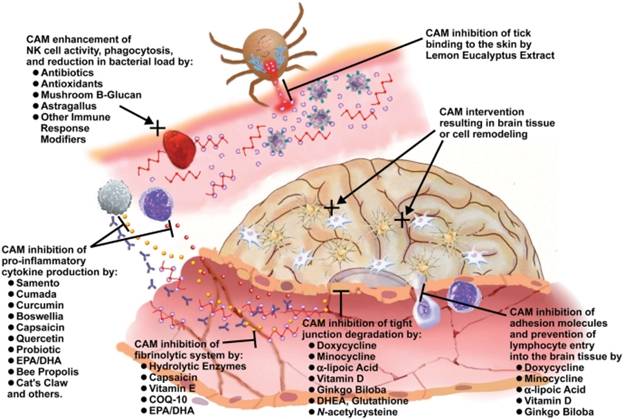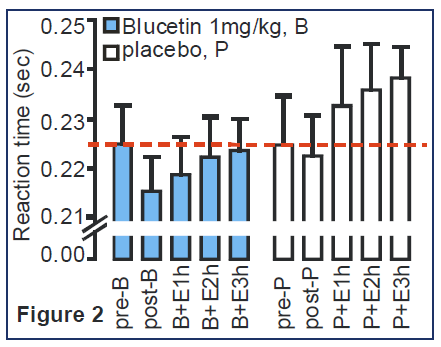Posted January 8, 2013: by Bill Sardi
Late in 2012 I was interviewed by George Knapp on the nationwide Coast To Coast radio broadcast and fielded questions from listeners in the last hour of the program. In the aftermath of that program I replied to over 2500 e-mail and telephone inquiries asking about perplexing health problems experienced by Coast To Coast listeners. The most common (and desperate) inquiries received were about natural remedies for Lyme disease, chronic anxiety, alcohol addiction, hepatitis C liver infection and wet macular degeneration.
Modern medicine does not have good remedies for these conditions. I have researched these topics at the National Library of Medicine and provide the following information with links to published scientific references.
Coast To Coast listeners with hepatitis C penned their pleas, asking if there were any alternatives to interferon treatment.
If you were born 1945 to 1964 you have a three times increased risk for hepatitis C. A history of intravenous drug use, needle-stick injuries, or a medical record that includes a blood transfusion or organ transplant, comprises most of the known risks for Hep-C. HIV-infected subjects incur a high rate of Hep-C liver infection, though 30% of the time Hep-C clears on its own.
Treatment for hepatitis C is arduous, to say the least. One common treatment for Hep-C increases the risk for fatal skin infections. Most Hep- C-infected patients say they would never undergo a second round of treatment due to terrible side effects. This means many patients with relapses are searching for alternatives.
The list of natural remedies for hepatitis C includes quercetin, licorice root, vitamin D and vitamin B12.
It is not surprising to learn that most Hep-C infected patients with liver disease (cirrhosis) exhibit vitamin D deficiency. Vitamin D activates neutrophils, fast-responding white blood cells. This would explain wintertime relapses when vitamin D levels are typically low due to lack of sun exposure.
In one study 89% of Hep-C patients were vitamin D deficient and experienced numerous manifestations of their disease outside of their liver (inflamed blood vessels and purple or red skin blotches). The liver is more likely to become scarred (fibrotic) among Hep-C patients with low vitamin D levels.
Another study shows that reported 86% patients treated with interferon and ribavirin plus oral vitamin D (2000 units) experienced a positive response versus only 41% without supplemental vitamin D.
Natural vitamin D3 is preferred over synthetic vitamin D2. The Vitamin D Council suggests 4000 IU per day of supplemental vitamin D. During active Hep-C outbreaks doses up to 50,000 IU vitamin D3 can safely be employed for a short-time (a few days).
A more recent development is the discovery that vitamin B12 may aid in the fight against Hep-C. In fact a recent report called vitamin B12 a “magic bullet against hepatitis C.” This was first reported a decade ago, but ignored.
In about 50% of people the infection is not cleared during antiviral therapy or they relapse after treatment ends. Vitamin B12 (5000 micrograms injectable) used with interferon and ribavirin improves clearance of the virus by 34% over the drugs alone.
Quercetin blocks the ability of the Hep-C virus from replicating and does not exhibit any toxicity. It may be used with other similar molecules to effectively address this viral liver infection.
A natural molecule, quercetin, naturally found in red onions and red apple peel, is known to have strong anti-viral action against Hep-C. Its combination with other natural molecules may provide synergistic action. Hep-C sufferers may benefit from reading this online report about interferon-free treatment, found here. Quercetin supplements are widely available.
The glycyrrhizin fraction of licorice root was recently found to exhibit ability to inhibit Hep-C in conjunction with interferon. However, this fraction of licorice may also raise blood pressure, so it should be confined to short-term use.
Low iron intake (avoidance of red meat and multivitamins with iron) is an alternative dietary measure against Hep-C.
Chronic anxiety generated a number of inquiries from the Coast-To-Coast audience.
Anxiety can have different origins. Some common causes of anxiety are menstrual tension associated with high estrogen and low magnesium levels and high sugar/high-saturated fat diets low in inositol,
Natural remedies for anxiety include magnesium, inositol and kava kava.
A clear relationship between magnesium shortage and anxiety reactions has been made.
A survey of patients complaining of symptoms of depression and/or anxiety found 78% were magnesium deficient.
Since animals are not subject to a placebo effect, they may provide a more reliable measure of the effect of magnesium shortage on mood. Magnesium deficient laboratory animals do exhibit anxiety.
A woman experiencing premenstrual syndrome with accompanying anxiety may have a normal blood serum level of magnesium but a red-blood cell magnesium deficiency. In other words, a normal blood test may not uncover a magnesium shortage.
Women experience more bouts of food craving than males, likely due to menstrual nutrient losses, particularly magnesium. Chocolate is a dietary source of magnesium. Women’s cravings for chocolate is often timed with their menstrual cycle. In fact chocolate is considered a form of “self-medication for magnesium deficiency.”
The consumption supplemental calcium combined with estrogen replacement therapy may induce anxiety as both induce a shortage of magnesium.
It was the late Midred Seelig who noted that the combined use of estrogen replacement and calcium supplementation can result in a shortage of magnesium which can result in adverse events (blood clotting, strokes, etc.)
A new form of magnesium complexed with threonate, a metabolite of vitamin C, has been shown to improve memory in animals. It may be a desirable form of magnesium for those who experience bouts of anxiety.
There is mistaken criticism that magnesium threonate does not raise blood levels of magnesium any better than magnesium sulfate, but magnesium sulfate is administered intravenously, magnesium threonate orally. This is not a fair comparison.
There is strong evidence for South Pacific Island root-herb known as kava kava to relieve anxiety. The data backing kava kava for anxiety is considered unequivocal.
Dr. Robert Peers in Australia reports that inositol given in mega-doses can alleviate anxiety. You can listen to him talk on this subject here.
Inositol has been found to be a valid treatment for panic disorder.
Inositol has been found to be effective for anxiety in animals.
The drawback of inositol is the ultra-high doses used in clinical studies — 18 grams (18,000 milligrams) – which worked better than an anti-anxiety drug. However, consumers report lower doses are beneficial.
Inositol is available in capsules and also as bulk powder.
So many Coast To Coast listeners inquired about natural remedies for lyme disease.
Lyme disease (LD) is the most common tick-borne disease in the northern hemisphere and produces disabling effects upon skin, nervous system, joints and the heart.
The lyme bacterium (Borella burgdorferi) is sensitive to various antibiotics, including penicillins, tetracyclines, and macrolides, but therapy is long-term and results are sometimes disappointing, and this bacterium is often resistant to treatment.
A number of natural remedies have been proposed to combat lyme disease, as seen in the following graphic.

I have to drift outside of published science here and share personal experiences by lyme sufferers. Since lyme is treated with antibiotics, it does not come as a surprise to learn that garlic is a good natural remedy for lyme disease. I have personally received many favorable comments about the use of garlic for this condition.
Garlic cloves when crushed will produce allicin, the active antibiotic ingredient. However, garlic pills generally do not produce allicin because stomach acid negates enzymatic conversion to allicin. Many garlic pills are labeled to contain or yield allicin, but garlic pill producers test their products in water, not acid. When garlic pills are tested in acid (vinegar) to simulate the acid environment in the stomach, they produce very little allicin.
There is a buffered garlic pill that utilizes alkaline minerals to produce proven amounts of allicin, equal to a clove of garlic. You can learn more about this here.
Thousands of inquiries were received asking if there are any natural remedies that would curb alcohol craving. There is a new answer to this problem and it comes from the Asian raisin tree (botanical name Hovenia dulcis).
Blue California (Rancho Santa Margarita, California) in collaboration with researchers at UCLA, has conducted animals studies showing a natural extract from the Asian raisin tree (trade name BluCetin®)curbs alcohol craving, lower blood alcohol levels and reduces or eliminates symptoms of intoxication including hangover symptoms. These claims need to be validated in human studies.
Blue California has just completed a human pilot study and the results obtained with BluCetin® and it improved reaction time (simulated red light driving test), reduced symptoms of intoxication and hangover symptoms and reduced blood alcohol levels. A chart is presented below showing reaction times with and without BluCetin® after alcohol consumption. To learn more (and for a complimentary sample), visit http://www.blucetin.com.
There are many traditional remedies for hangover but few (if any) scientifically validated products like BluCetin®. Don’t use products like these to give you license to drink more alcohol. Even though ingredients in BluCetin® reduce blood alcohol levels, alcohol is still toxic to the liver and exerts deleterious effects upon the brain. Alcohol depletes vitamin B1 (take fat-soluble benfotiamine form of B1), magnesium and zinc and induces iron overload. Individuals with alcohol dependency or who are attempting to back away from alcohol should supplement their diet with the above nutrients.

Addendum: During my first interview on Coast To Coast radio I shared information about a nutriceutical that has been shown, on a preliminary basis, to be effective at quelling symptoms of a blinding eye disorder called wet macular degeneration.
Recognize I am commercially involved here, as I formulated the product (Longevinex®) that has been successfully used in a small number of cases.
Longevinex® has filed a petition with the FDA to allow it to proceed in studying its product among individuals who have failed conventional treatment (injection of medication directly into the eyes). At this writing, we await direction from the FDA.
Longevinex® cannot make any claim that it prevents, treats or cures any disease. However, because there are thousands who are progressing to permanent vision loss and have no hope, we report that many people with this eye malady have reported positive results in the aftermath of the Coast To Coast broadcast. At this time, we cannot offer any promises, but we can offer hope.
One 68-year old Coast To Coast listener in Las Vegas, told by her doctor she was going to go blind, regained her sight and was able to resume night driving by taking Longevinex®. Her doctor said “It is completely gone. I’ve never seen this before.” This is an anecdotal report and may not be everyone’s experience. Only an expanded human trial will tell more. We await a ruling from the FDA as to whether we can proceed with a human study. To learn more go to Dr. Stuart Richer’s website. You can also view an online news report by KLAS news reporter George Knapp here. ####
Posted in Dietary Supplements, Minerals, Vitamins ; No Comments »
You must be logged in to post a comment.
11
17
52
95
14
24
237
6
56
43
10
116
15
66
105